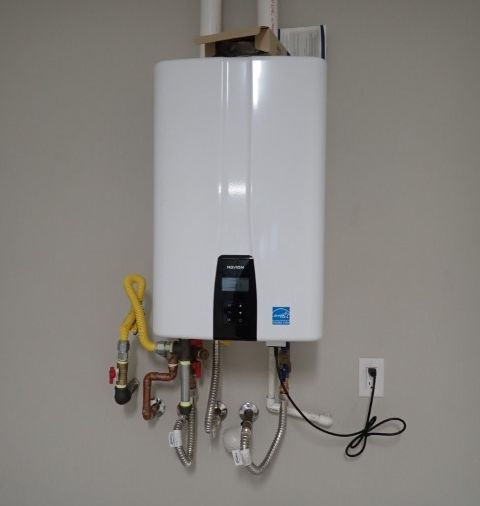A client recently asked me about the pros and cons of tankless water heaters. Tankless water heaters have become more popular in recent times. While they are definitely a valid option for hot water in residential homes, there are some pros and cons homeowners should be aware of.
Pros of tankless gas water heaters
High flow rate: Tankless gas water heaters can provide a higher flow rate of hot water compared to electric models. This makes them a good choice for households with high hot water demand.
Energy efficient: Gas models tend to be more energy-efficient than electric models. They use natural gas or propane to heat water on demand, rather than relying on electricity to heat a large tank of water.
Lower operating costs: Natural gas or propane tends to be less expensive than electricity. Therefore operating costs for a gas tankless water heater can be lower than an electric model over time.
Cons of tankless gas water heaters
Higher upfront costs: Gas models tend to be more expensive to purchase and install than electric models.
Gas line requirements: A gas tankless water heater requires a gas line of appropriate capacity. This might require additional installation costs.
Venting requirements: A gas tankless water heater requires proper ventilation to vent exhaust gases. This might require additional installation costs or modifications to the home.
Pros of tankless electric water heaters
Lower upfront costs: Electric models tend to be less expensive to purchase and install than gas models.
No gas line required: Electric models do not require a special gas line, so installation costs may be lower.
No venting required: Electric models do not produce exhaust gases, so no ventilation system is required.
Cons of tankless electric water heaters
Limited flow rate: Electric models may have a lower flow rate compared to gas models. This might not be sufficient for households with high hot water demand.
Higher operating costs: Electric models may be less energy efficient than gas models, as they rely on electricity to heat water on demand.
Potential for overload: Electric models require a significant amount of electricity to heat water on demand. This can overload the electrical system if multiple high-demand appliances are used at the same time.
Longevity
The longevity of a tankless water heater is generally longer than a traditional tank water heater. A tankless water heater can last 15-20 years or more. A traditional tank water heater typically lasts 10 to 15 years. This is because tankless water heaters do not have a tank, which is the part of a traditional water heater that is most likely to fail.
However, there are some factors that can affect the longevity of a tankless water heater, such as the type of water heater, the water quality, and the maintenance of the water heater. For example, a water heater that is installed in an area with hard water will likely need to be descaled more often. Without regular descaling, it will shorten its lifespan.
Popularity
Based on my experience, here are the water heater types that I see in my job, ranked by popularity:
- Gas tank water heaters – by far the most popular
- Electric tank water heaters – seen most often in neighborhoods that don’t have gas service
- Gas tankless water heaters – becoming more popular now, especially in new construction
- Electric tankless water heaters – pretty rare for me to see one of these
What is the best choice for you?
Now that you know more about the pros and cons of tankless water heaters, the answer is: It depends.
Ultimately, the choice between a tankless gas water heater and a tankless electric water heater will depend several factors. For example, your individual needs, such as the hot water needs of the household, energy efficiency goals, and available utility services. I recommend consulting with a qualified licensed plumber for guidance based on the specific details of your home and hot water needs.

